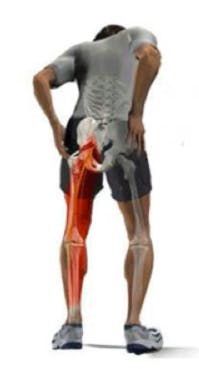By: Dr. Richard DeFalco, DPT, OCS, CSCS, CWcHP, Cert. DN
As part of the typical day in our physical therapy offices we treat numerous patients who often complain of having or having been diagnosed with “sciatica.” Most patients often associate any pain in the buttock or leg as sciatica. Most suffer with it long enough to believe the misconception that it is something they have to live with! The fact is that there are treatment options for you, many of which are conservative, and offered as part of the physical therapy treatment design.

First, let us clearly define the “diagnosis” of sciatica. Sciatica is usually described as pain, tingling, numbness, or “electrical shocks” that radiate down the buttock, thigh, and lower leg. Sometimes there may be weakness in the leg as well. It is caused by pressure or irritation to the sciatic nerve which starts in the lower back and travels down the back of the each leg and is responsible for movement and sensation in the leg. Pain descriptions can vary from a dull persistent ache to stabbing pain that immobilizes a person. Often times, the pain is described as “being deep in the leg.” There can be reports of numbness in the back of the leg, calf, or foot. The pain can be provoked with prolonged standing or sitting, straining of the back with lifting, and even with sneezing, coughing, and bowel movements. A person may experience difficulty lifting the leg off of the bed, difficulty pointing their foot down or lifting their heels of the floor while standing. There may also be a limited ability to bend forward towards the ground.
So in fact, sciatica is a symptom of another medical problem, not the root cause. Examples of the causative diagnosis may include sciatic nerve compression due to a lumbar disc bulge, compression due to muscle entrapment (hamstring syndrome, piriformis syndrome), a narrowing (stenosis) of the openings of the spine that nerves travel through, as well as other medical conditions.
They key to treating sciatic nerve pain, is to identify where, when, and how the irritation to the nerve is occurring. An appropriate analogy may be to think of a garden hose with the water flowing freely that for whatever reason gets a kink in it or someone steps on it. The subsequent flow of water is then compromised. Nerve compression is very similar in that there is a “kink” or pressure on the nerve that needs to be removed for proper flow (signal transmission) to return to normal.
Through a thorough physical therapy examination by a board certified orthopedic specialist, we can identify the pattern of irritation, and develop and appropriate treatment plan, to minimize and ideally eliminate your symptoms. Treatment options may include manual therapy to improve spinal mobility and relax muscle spasms, spinal traction to reduce pressure of spinal discs, dry needling for soft tissue dysfunction and trigger points, specific exercise to reduce pressure on the spine, stretch shortened muscles, and therapies to increase the nerve’s mobility.
At Professional Rehabilitation Services we pride ourselves in distinction and are continuously in pursuit of specialty training to provide our patients with a higher level of care. One of our Board Certified Orthopedic Physical Therapists will pursue an individualized treatment approach to your needs. Less than 5% of physical therapists in South Carolina are board certified in orthopedics. All physical therapists at Professional Rehabilitation Services are board certified. So if you or someone you know lives with sciatica or a similar problem and would like to know more, then seek the consultation of a physical therapist at one of our three locations or see your physician for a referral to one of our facilities. Physical therapy is a regularly covered service by most health insurance plans. Free 15 minute consultations are a great way to identify if you are a candidate for treatment!
At Professional Rehabilitation Services, we treat a wide variety of musculoskeletal conditions using the latest in evidence based therapies provided by highly credentialed physical therapists. In addition to being licensed physical therapists, our providers have additional specialty certifications and training in orthopedics, manual therapy, sports, strength and conditioning, vestibular rehabilitation, and dry needling. For further information on this or other related topics you can contact Richard DeFalco, DPT, OCS, CSCS, CWcHP, Cert. DN at Professional Rehabilitation Services (Myrtle Beach) (843) 839-1300, Brian P. Kinmartin, PT, DPT, MTC, OCS, STC, CWcHP, Cert. DN, (Pawleys Island) (843) 235-0200, or Richard A. Owens, PT, MS, OCS, Cert. SHT, CWcHP, Cert DN (Surfside) (843) 831-0163, or visit our website at www.prsrehabservices.com where you can learn more about the company and even download a referral form for you physician to fill out. You can also call and schedule a free 15 minute consultation!
